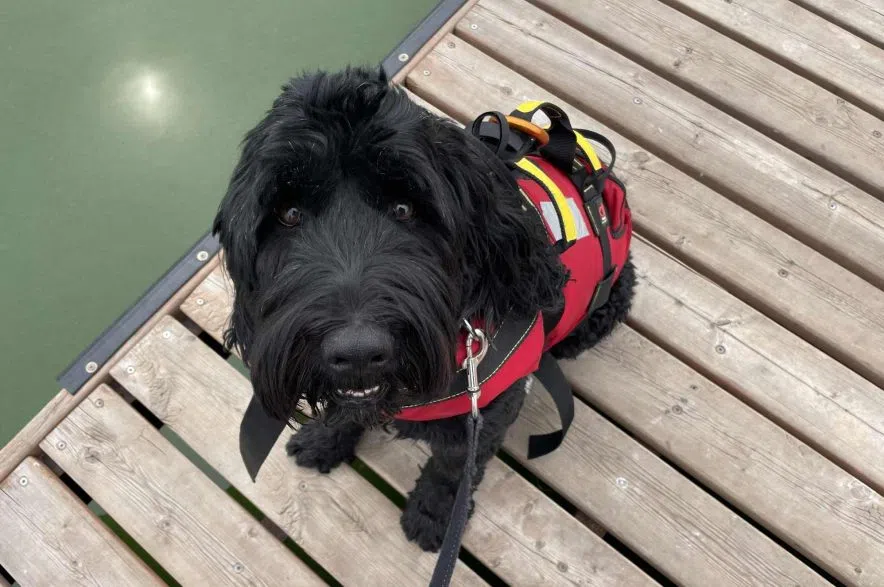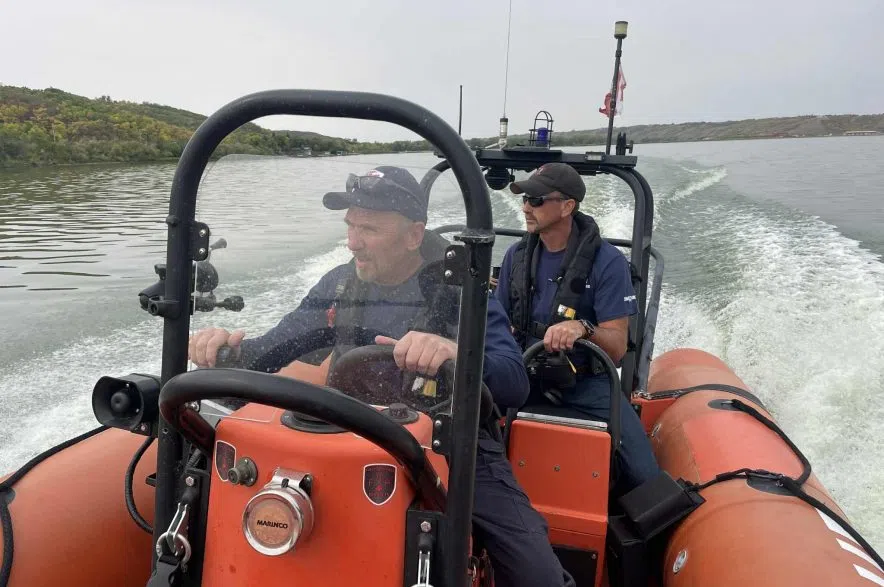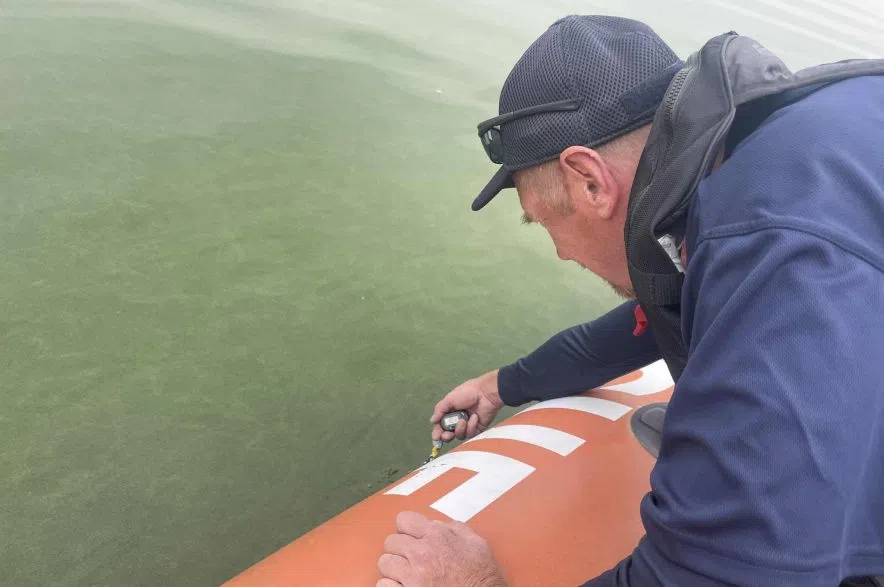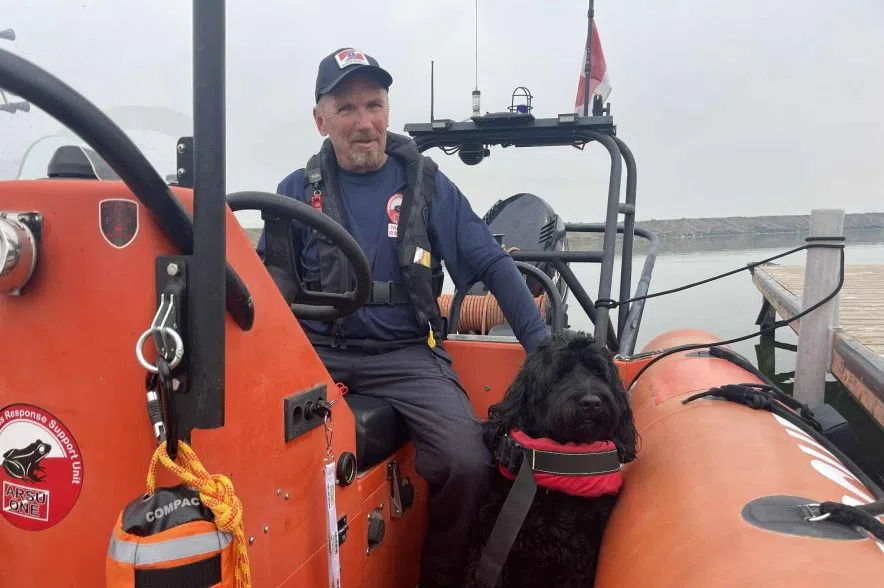While members of a volunteer water rescue unit scan the waters at Echo Lake, one of them follows his nose in dangerous situations.
K9 Gustav, one of Saskatchewan’s few active water rescue dogs, has been a key part of Amphibious Response Support Unit One (ARSU1) for the past four years.
Read more:
- Weyburn police dog Beaumont passes after over a decade of service
- Regina police officer shoots dog during attack
- ‘This is an emergency’: Regina Humane Society struggling with dog capacity issues
Listen to the story on Behind the Headlines:
Gustav’s handlers and director of the unit, John Maczko, said the water rescue dog has been a key member of the unit.
“It’s his work ethics and his work drive that really sets him apart from other dogs,” he said, patting the dog panting beside him.
ARSU1 is a non-profit that helps assist with water emergency’s alongside police agencies and fire departments. It’s based out of the Echo Valley area.
The Portuguese water dog often accompanies Maczko in the rescue craft while it drives off for safety patrols.
“We’ve had Gustav help assist us in in four situations where we’ve assisted in saving lives,” Maczko said. “Has had four successful deployments with positive outcomes.”

K9 Gustav dresses in a live vest for people to hold onto while he swims back to shore. (Gillian Massie/ 980 CJME)
Each day, Gustav is dressed in a specialized canine personal flotation device.
“People can actually hang on to those handles, and then he’ll swim back to shore,” Maczko said.
Gustav weighs about 61 pounds, and can swim with a person up to three times his weight.
Maczko said the pair trains together for any kind of emergency situations in water and on the beach.
When Gustav jumps into the water from the rescue craft, a floating rope is tethered to his vest.
“If someone is really aggressive, Gustav may choose only to get close enough to take a line to them,” Maczko said. “Then we pull them both out with our rescue line.”
Maczko said the group’s primary goal is to help first responders in emergency situations, but these safety patrols help any harmful situations from taking place.
“Our goal is to intervene before an incident turns into a 911 call,” he said. “If we can do that, what that does is it’s less likely that an incident will turn tragic.”
A career in water rescue
Maczko has been helping people in emergency situations long before Gustav began working alongside him.
When Maczko was 16 years old, he saved someone who was drowning on a beach in Hungary.
Maczko was swimming at the beach with some friends when they noticed the person in trouble.
When the boy fell unconscious, the group was able to get the boy onto a boat and to shore.
Maczko swam back and administered emergency CPR, which revived him.
“I think if you’ve ever saved a life, or if you’ve ever assisted in preventing a loss of life or injury in this field, it’s it is extremely rewarding,” he said.
Maczko has spend his 35-year career in water rescue, working in places like the United Kingdom and Ontario.
When he took a job in Regina, Maczko helped created the water rescue unit in 2015 after looking into the province’s capacity and resources in relation to water rescue.
From there the ARSU1 was created. The unit also has a dive team trained to conduct search and rescues in water, clean-ups in and around the lake.

John Maczko and David Schill ride on the Amphibious Response Support Unit One boat on Echo Lake. (Gillian Massie/ 980 CJME)
Maczko leads about 10 to 15 active members with the rescue non-profit.
David Schill, a volunteer, said the experience helping others has been rewarding.
“I joined for community awareness so that they know we are here to help,” he said.
Anytime a tragedy on the water is prevented, Maczko said a day on the water is worth it.
Challenges in every season
While there are less boaters and swimmers this time of year, Maczko said people should always be wary of colder temperatures in the water.
“If someone is in trouble in the water, the time that we have to to respond and to get them out of the water and provide them care — that window is a lot shorter,” he said.
If a boat capsizes, Maczko said people may go into “cold shock” being startled by the water.

John Maczko takes the temperature of Echo Lake before starting an Amphibious Response Support Unit One safety patrol. (Gillian Massie/ 980 CJME)
“We ask everyone (to) wear a life jacket,” he said. “It will keep you afloat. “It will keep your head above water, and it will increase your chances of survivability in cold water or any water situation, up to 90 per cent.”
One incident Maczko said he and his team responds to the most frequently is people getting stranded after drifting out too far on pool toys or floaties.
“These floaties are really not designed for as a boat,” he said. “They’re very thin material. They’re not designed to be out in the middle of the water.”
Maczko said people often get pushed out too far into the lake in high winds, and aren’t wearing life jackets.
He said to call 911 in any emergency situation.











